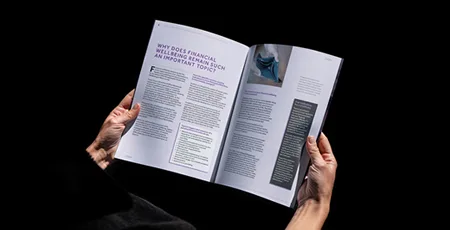Research in action
The DBA gives professionals the opportunity to gain a doctoral degree while working.
The DBA gives business professionals the opportunity to gain a doctoral degree while they continue working. Here we profile four professionals from very different backgrounds who have found the DBA a truly enriching experience.
The civil engineer
Canadian civil engineer Alexander White began his part-time DBA five years ago while then working as Chief of Planning and Development for the Toronto Terminals Railway (TTR) company. His proposed area of study was the use of Public Private Partnership (PPP) business models in public infrastructure delivery, and at the time he had been looking for ways to research the rapidly growing industry further.
Having looked at programmes all over the world he chose Manchester because of the strength of its academic research in this field, and also because the course was part-time which would enable to split his time between industry and academia.
Alexander has since changed jobs to work for Plenary Americas, a leading specialised developer of long-term PPP projects, and says the decision was in part driven by the progression of his DBA studies. "Plenary is a real specialist in the PPP field and that was a major attraction for me as I continued through my studies at the same time," he says.
Perfect bridge
As a Director of Project Delivery at Plenary, Alexander has specific responsibilities for a portfolio of hospitals across the province of Ontario, and as such was able to base his empirically-based DBA thesis on the actual operational performance and delivery structure of various hospital facilities.
Alexander says the new job helped feed into his DBA studies in innumerable ways, and likewise the skills and disciplines he learnt from his DBA fed back into his day to day working role.
"Studying for the DBA has proved invaluable and is the perfect bridge between industry and academia. At a basic level it has significantly improved my data analysis and report writing skills, but what I also found was that clients were very interested and impressed by my interest in critically analysing the business models and being immersed in the subject matter. This is exactly what attracted me to the DBA in the first place, the ability to carry out in-depth research while also making it as applicable as possible to the industry I was working in."
Studying for the DBA has proved invaluable and is the perfect bridge between industry and academia.
COVID-19 impact
Meanwhile Alexander says the hospitals he manages have been able to cope very well with the COVID-19 crisis. He says one of the key reasons is that they were all built in the aftermath of the 2003 SARS outbreak in Toronto. "This heavily influenced their design and ensured their layouts could handle a pandemic event. The hospitals were also designed to ensure that there was 100% fresh air circulation throughout buildings which is also critical."
The pandemic meant that Alexander was only able to graduate 'virtually' last summer, so he is looking forward to returning to Manchester sometime soon to catch up with his supervisors, Professors Anne Stafford and Pam Stapleton.
The Chief Information Officer
As Chief Information Officer (CIO) for the UK and Ireland at global real estate firm JLL Joanne Ormandy is seeing first-hand the huge impact that technology is today having on the sector.
The whole field of ‘proptech’ - property and technology – is a fast and dynamic one that is rapidly impacting the real estate industry as innovative technology solutions transform traditional practices such as viewings, valuations and building management. The drive has been only accelerated by the pandemic with property companies realising they need to quickly embrace new technologies to remain competitive and efficient.
Proptech is the precise subject of Joanne’s DBA where she is currently in her third year. However her interest in how technologies are transforming the global world of business is deep-rooted.
Her first degree was in biotechnology, specialising in bioinformatics, and she has since worked across the world in marketing, finance, and strategy roles for various Fortune 500 firms. She also completed a MBA from Alliance MBS in 2017 at our Hong Kong centre while working there.
In her present role she manages a team of more than 60 people supporting more than 4,000 daily users, while her job also involves defining and implementing the technology strategy for the business. "My job is essentially to make sure that all our tech services are running smoothly while the company also has a vision that it can deliver."
Joanne says juggling such a high-profile job with her studies is inevitably challenging, but is worth it for the rewards.
"A DBA is a journey, so it’s important that you are passionate about the topic you plan to study. You also need to be persistent and focused as at times it can be difficult balancing work, family, and research responsibilities at the same time. It is also something that you have to work on every single day, so you need to be very disciplined and have a very understanding family and support network around you.
"But it is also an extremely rewarding experience. I love doing my DBA and being supported by world class experts who challenge me. Also, if you are clear on why you are doing it and how it will support your career aspirations, I would highly recommend it."
Benefits
She says another key benefit of a DBA is that because it is specifically designed for business professionals you can combine your own market experience with the academic literature and make a distinct industry contribution.
"A DBA sets you apart in the marketplace and gives you the opportunity to spend time focusing on a topic you’re passionate about. I enjoy researching so I am spending time doing something I love, while at the same time I’m developing my research skills and critical thinking. There is then a reciprocal benefit as I can apply what I learn to my job, and apply what I learn in my job to my studies."
Importantly, she adds, it gives her the opportunity to think differently and more critically.
"I am meeting people outside of my corporate job and industry who have a different point of view, with different backgrounds and experiences. I have a challenging day role, which I enjoy, but at times it can be very intense. Being submersed in the academic world allows me to take a different perspective on problem solving, and analyse situations at a deeper level."
The marketeer
Having spent most of her career in the marketing and business data industry Dawn Holmes, who is nearing completion of her DBA, now splits her time between studying, teaching and consulting.
She says this mix proves invaluable as each element naturally feeds off each other. "I love the mix of challenges I face in my working day. Typically, in the morning I could be a student myself, in the afternoon I could be teaching on a programme where I have become a specialist, and in the evening I could be doing consultancy work for a client.
"The wider point is that my own studies are keeping me up to date with recent trends and ideas, my consulting work is keeping me in touch with business issues and the real world, and my students are keeping everything in perspective and very real for me. At the end of the day, if you cannot explain something to an 18-year-old that gets them energised about learning, then you don’t understand it yourself."
Business systems
Dawn has long-established links with Alliance MBS having graduated with a MBA in 1992. At the time she had just begun her career in marketing and was keen to supplement her knowledge with a more formal business education. A few years later she joined Manchester-based electronics company Brother where she worked for many years on a number of marketing campaigns, and also in the emerging field of business information systems and data-driven decision making.
After leaving Brother she set up her own marketing consultancy and, in order to open up more opportunities with larger clients, she embarked on a DBA investigating the use of data to improve B2B customer experiences.
As she explains: "The key questions I wanted to ask revolved around what, how and why. What are companies doing, how are they doing it, and why are they doing it? As part of this I’ve been exploring what is getting in the way and what are the main challenges, and how academic theories and knowledge might help with overcoming them. The end goal is to build a framework, or conceptual model, that will be useful to practitioners. It is not quite a ‘how to’ guide, more a ‘here are some things to think about’ guide."
Sector study
As part of her research Dawn has been comparing three very different types of companies in very different sectors - IT, engineering and marketing - to see how much of an impact the sector context has. "One of the biggest challenges for me has been in defining the research, especially in relation to specific terms around data and customer experience. Both areas have a multitude of definitions, so honing that down to something that is relevant and meaningful to management practitioners has been tricky but interesting."
The oil industry specialist
Asked about his job in the oil industry and Scott Wagstaff jokes that he is an "expensive plumber". But his skills in creating oil wells and providing hardware for oil extraction have taken him all over the world over the past 20 years.
Today he lives and works in the Middle East where he is a senior completions engineer for a national oil company, and during his career he has split his time equally between working for service companies which produce oil industry equipment, and the big operators which run oilfields.
In recent years the links between the two have grown, especially as manufacturers across the sector have been looking to build more revenue streams from specific services. This so-called ‘servitization’ of manufacturing isn’t unique to the oil industry, and is a trend that has been seen across many sectors.
Having worked for both service companies and operators, in recent years Scott has developed a growing interest in the relationship between the two, especially as he has risen to more senior management roles within the industry. So he decided to apply for a DBA to look in more depth at the servitization model across the oil industry and says one of the main reasons that he chose Alliance MBS was the School’s triple accreditation, as well as its world-renowned research strengths in fields such as servitization.
Academic paper
A paper that he co-authored with his Alliance MBS supervisors recently appeared in the Journal of Business & Industrial Marketing and explores the relationship between service companies and operators, and specifically the tensions that emerge between them during the servitization process.
He says the study shows that servitization is not a quick fix and that management support in such a scenario is essential. "Although the top tier of management can often be very positive about servitization, this message gets watered down as you go further down each tier of management. In the end human factors over-ride the business benefit. Another important point is that this can happen even when there are strong environmental benefits to servitization such as through the development of new techniques and technologies."
Academic role
Scott has so enjoyed the whole experience of the DBA that in the future he would like to move into more of an academic role.
As he adds: "In terms of the demands on your time, and particularly managing the study on top of your day job, there is no doubt that you - and your family too - have to be fully committed to the DBA. For me it has been really worth it because it has changed my whole way of thinking. Critical thinking is now something that comes naturally to me and I find myself asking questions that I would never have previously asked.
"What I have done is also quite unusual in the oil industry as managers are far more likely to do a technical masters rather than one built around business thinking, so again this added perspective puts me at an advantage."





